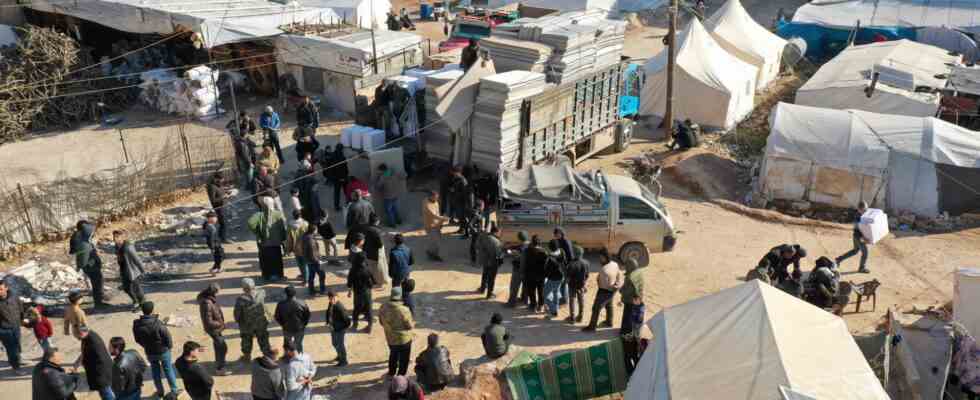Status: 06.03.2023 8:10 a.m
The suffering in the earthquake area in north-west Syria is still indescribable. There is a lack of clean drinking water, tents and medicine. Millions of children are threatened by hunger and cold.
Numerous children are sitting on the side of the road in Afrin. The city is located in northwestern Syria, which is controlled by insurgents. Next to it is a tent made of tarpaulins and blankets. Several families have built such temporary shelters here to protect themselves a little from the cold.
“Since the day of the earthquake we have been homeless, without tents, without shelter, without anything,” a young woman told the opposition channel Syria TV. “People say there is relief, but we don’t see it. We have babies who need diapers. We are appealing to the whole world to help us. Whoever hears our voice, please help us.”
WHO: Don’t close your eyes
The UN emergency aid coordinator has now admitted that the people in north-west Syria had to wait far too long for help. Even though about 500 trucks with UN relief supplies have now arrived in the region, there is still a lack of almost everything: clean drinking water, tents, medicine.
Last week, Tedros Adhanom Ghebreyesus, director of the World Health Organization (WHO), became the first head of a UN organization to visit north-west Syria. He was deeply dismayed by the extent of the earthquake disaster. “We must not close our eyes and turn our backs on the Syrian people. We must not allow this to become a forgotten crisis,” he said.
Front course across earthquake area
At the same time, the WHO chief also denounced the political situation. The Assad regime is preventing or making it difficult for aid to reach the war-torn people in north-west Syria. Because the front lines run right through the earthquake area, there are only three border crossings to Turkey that are open to UN aid.
“Every border crossing should be used to help the Syrian people,” said WHO chief Ghebreyesus. “I don’t think the existing three border crossings are sufficient.” Every possible access should be used.
1000 schools were destroyed
Thousands of people are still missing in north-west Syria. Much of the rubble has not been moved at all since the earthquake because there is still a lack of excavators and other heavy equipment. In partially destroyed hospitals, doctors continue to fight for the lives of the injured.
According to UNICEF, millions of children in Syria and Turkey are at risk of illness and cold. Around 1,000 schools have been destroyed, said Unicef Managing Director Catherine Russel in Aleppo. “We have to ensure that children continue to receive education. It is very difficult. We set up classrooms.” She believes that everyday school life is absolutely important so that the children don’t drop out and drop out of school. “But here it’s definitely a challenge.”
Schools should not only be the place for teaching, but also a space for psychological help, for trauma processing, said Russel. “We talk to the children about what this crisis means for them and how challenging it is for their families. So that the children understand that they are not alone.” Unicef supports them emotionally so that they can better deal with the problems.
Worried about a cholera outbreak
The suffering in the earthquake area in northwestern Syria is still indescribable – chaos still reigns. There is growing concern that diseases such as cholera will continue to spread. Another danger: land mines. After the earthquake, thousands of people rushed to find a new home.
They would have simply set up a tent somewhere – even in areas that have been mined by years of war, says a father. “The greatest danger is that one of our children hits an explosive device. Be it a landmine, a bomb or something similar, that’s dangerous,” he says.
A month after the devastating earthquake, reconstruction or even everyday life is still unthinkable in north-western Syria. The emergency aid is just beginning, it has just started.
A month after the earthquake in Syria
Miriam Staber, ARD Cairo, March 6, 2023 6:45 a.m

